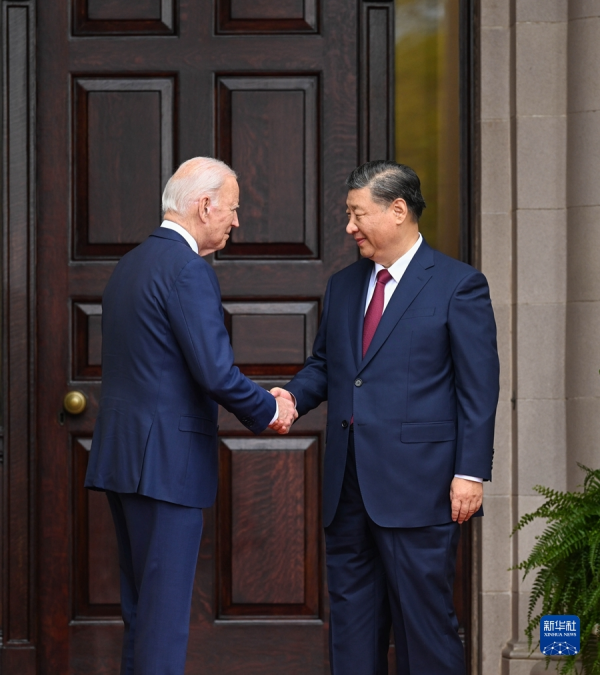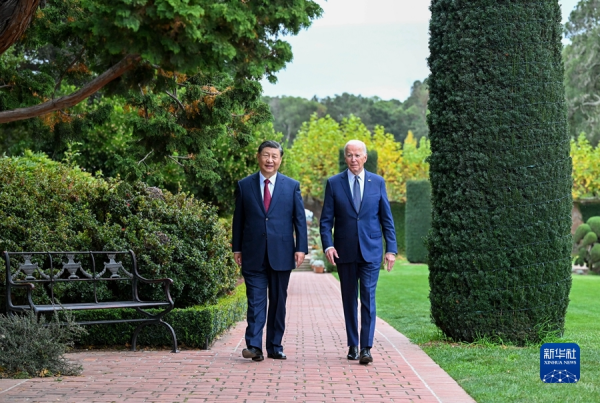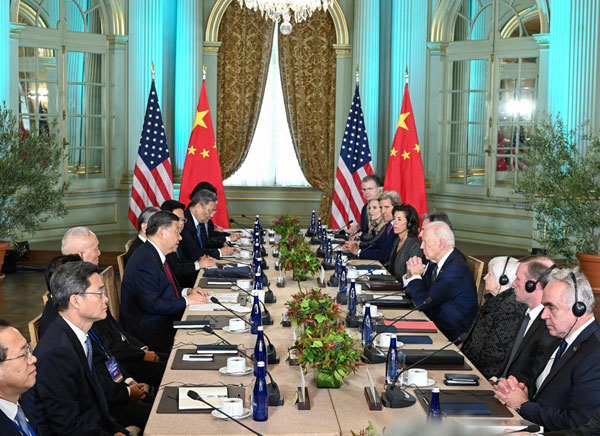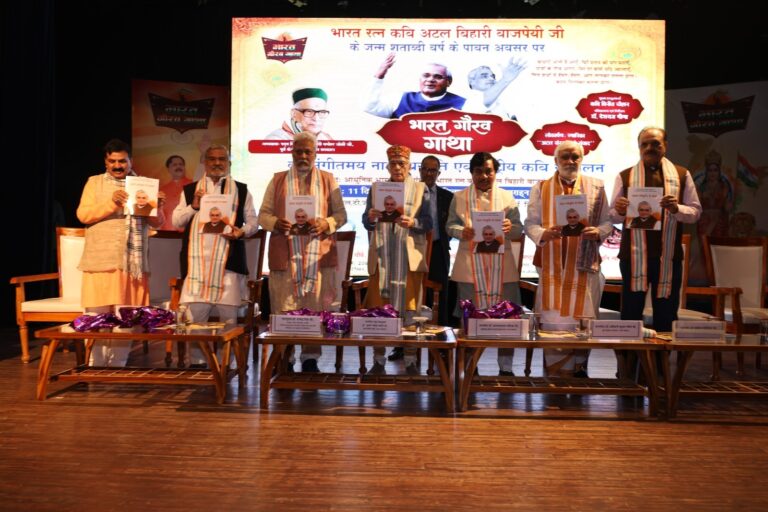
US President Joe Biden with Chinese President XI Jinping. Photo source: Chinese foreign ministry.
San Francisco/Beijing: After the summit meeting between the visiting Chinese President Xi Jinping and the President of the United States Joe Biden today, the Chinese foreign ministry stated in Beijing that San Francisco should be a new starting point for stabilizing China-US relations. China said it was a “fruitful” meeting with over 20 common understandings in political, diplomatic, cultural and people-to-people exchanges, global governance, military, security and other fields.
In turn, Biden told reporters at Woodside in California that he believed “they were some of the most constructive and productive discussions we’ve had”. Both also exchanged views on a range of regional and global issues, including Russia’s refusal to stop the war of aggression against Ukraine and the conflict in Gaza. He also raised areas where the United States has concerns about China’s actions, including detained and exit-banned US citizens, human rights, and corrective—coercive activities in the South China Sea. “We discussed all three of those things. I gave them names of individuals that we think are being held, and hopefully, we can get them released as well. No agreement on that. No agreement on that. I also stressed the importance of peace and stability in the Taiwan Straits”, he said, asserting that the US maintains an agreement that there is a One China policy and that — “and I’m not going to change that”.
Both leaders made some “important progress” built on the groundwork their respective countries laid over the past several months of high-level diplomacy between their teams.
“I’ve been meeting with President Xi since both of us were vice presidents over 10 years ago. Our meetings have always been candid and straightforward. We haven’t always agreed, but they’ve been straightforward,” Biden said. About Xi, he remarked, “I think I know the man. I know his modus operandi. He’s been — we have disagreements. He has a different view than I have on a lot of things. But he’s been straight. I don’t mean that he’s good, bad, or indifferent. He’s just been straight”.
Chinese foreign ministry spokesperson Mao Ning told reporters in Beijing, “The meeting identified the direction and drew up a blueprint for the sound, steady and sustained development of bilateral ties. It was a positive, comprehensive and constructive meeting of strategic and far-reaching significance”.
Highlighting the achievements of the meeting, Biden said both nations would get their experts together to discuss risk and safety issues associated with artificial intelligence. Also, both nations were reassuming the “critically important”direct military-to-military contacts, which were cancelled after the United States House of Representatives Speaker Nancy Pelosi visited Taiwan last year.
At the same time, Biden reminded Xi of the USA’s warning to stay away from any interference in the upcoming election in Taiwan. “I made it clear: I didn’t expect any interference, any at all,” he said. Xi said the Taiwan question remains the “most important and most sensitive issue in China-US relations”. He asserted, “The US side should take real actions to honour its commitment of not supporting “Taiwan independence”, stop arming Taiwan, and support China’s peaceful reunification. China will realize reunification, and this is unstoppable”.
On a more positive note though, after many years of being on hold, both countries today decided to restart cooperation on counternarcotics. Biden was quick to note that more people in the United States between the ages of 18 to 49 die from fentanyl than from guns, car accidents, or any other cause. In 2019, China took action to reduce the amount of fentanyl shipped directly from China to the United States. “But in the years since that time, the challenge has evolved from finished fentanyl to fentanyl chemical ingredients and — and pill presses, which are being shipped without controls. And, by the way, some of these pills are being inserted in other drugs, like cocaine, and a lot of people are dying,” Biden told reporters. He added, “So, today, with this new understanding, we’re taking action to significantly reduce the flow of precursor chemicals and pill presses from China to the Western Hemisphere. It’s going to save lives, and I appreciate President Xi’s commitment on this issue”.

Biden welcomed the “positive steps” taken today and said it was important for the world “to see that we are implementing the approach in the best traditions of American diplomacy. We’re talking to our competitors. And the key el- — and just talking, just being blunt with one another so there’s no misunderstanding is a key element to maintaining global stability and delivering for the American people”.
He further disclosed that in the months ahead, both countries were going to continue to preserve and pursue high-level diplomacy with each other. He said the lines of communication between President Xi and him would be kept open. “He and I agreed that either one of us could pick up the phone, call directly, and we’d be heard immediately,” he said.
According to the US President, these were tangible steps in the right direction to determine what’s useful and what’s not useful, what’s dangerous and what’s acceptable. “The United States will continue to compete vigorously with the PRC [People’s Republic of China]. But we’ll manage that competition responsibly so it doesn’t veer into conflict or accidental conflict,” he said, adding, “And where it’s possible, where it is in our interests are — coincide, we’re going to work together like we did on fentanyl”.
Interestingly, when asked by a journalist whether after today, would he still refer to President Xi as a “dictator” – a term that he used earlier this year, Biden said, “Well, look, he is. I mean, he’s a dictator in the sense that he — he is a guy who runs a country that — it’s a communist country that is based on a form of government totally different than ours. Anyway, we made progress”.
Biden also told Xi about Washington’s objection to Beijing’s “non-market economic practices” that disadvantage American businesses and workers. Xi, on his part, claimed that the US actions against China regarding export control, investment screening and unilateral sanctions ”seriously hurt China’s legitimate interests”.
When a reporter further pointed out to Biden that in the past two years, there were more than 180 incidents of Chinese aggression against US aircraft in the Indo-Pacific, and, the ramped-up military activity in the South China Sea. “If that does not count as veering into confrontation, then what does?” the journalist asked. Biden replied by saying, “Well, first of all, none of it did end up in a conflict. Number one. Number two, you may recall: I did a few little things like getting the Quad together, allowing Australia to have access to new submarines, and moving in the direction of working with the Philippines. So, our actions speak louder than our words. He [Xi] fully understands”.
Xi, however, made it clear to Biden that the two sides should assume a new vision and build together “five pillars for China-US relations” :
- Jointly developing the right perception;
- Jointly managing disagreements effectively;
- Jointly advancing mutually beneficial cooperation;
- Jointly shouldering responsibilities as major countries;
- Jointly promoting people-to-people exchanges.
– global bihari bureau






